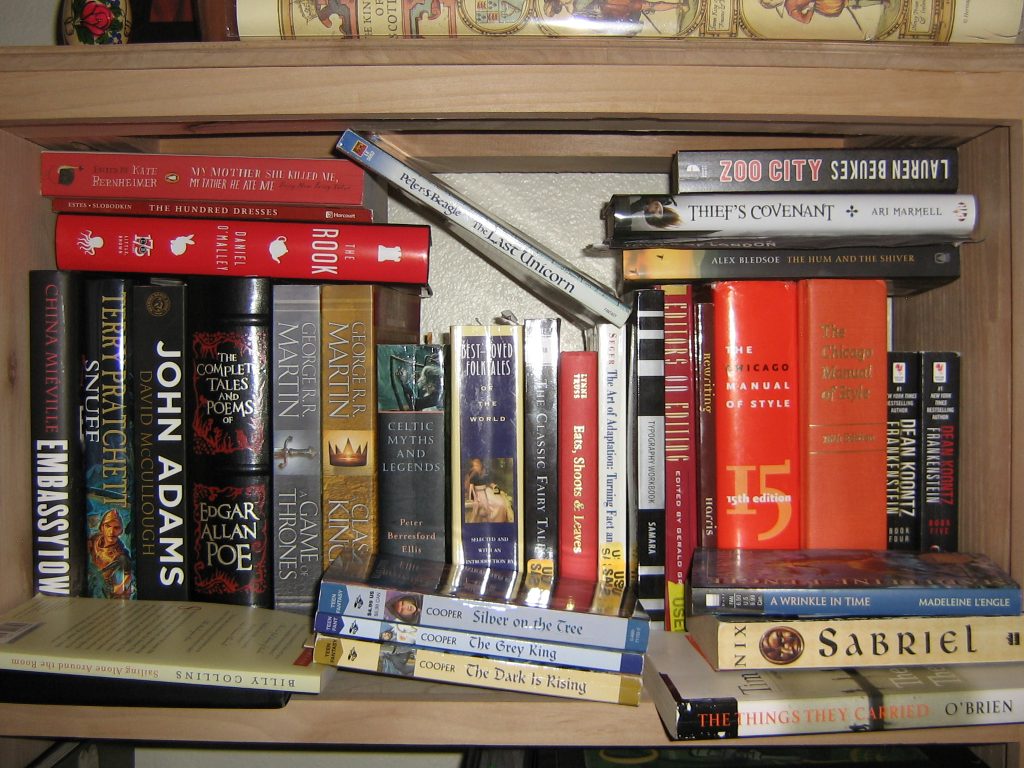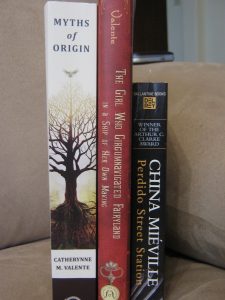Today I’m going to take a timeout from being a Serious Editing Professional and let you in on a secret: most every editing professional is a hopeless, passionate book lover. Don’t let them fool you with their comma-tinkering, fierce plot critiques, or official-sounding titles. Many of them are astute, professionally trained, and incredibly skilled, but underneath those things, they’re enthusiastic readers. I’m no different.
To give you a peek at my reader-life, today I’m going to share a look at my bookshelf. This is a special bookshelf: it’s transient. I’m in the middle of a months-long visit to an Air Force base, but since it’s only months long instead of a year or more, my husband and I left most of our books in my parents’ shed in Utah (thank heaven for their free space; we stole plenty of it). Here are all our books, minus books of scripture, those in foreign languages, and those I’m currently reading.
The Breakdown
Some of these books are titles Mr. Stewart and I have acquired since arriving here: you’ll see both Thief’s Covenant and The Rook, books that have only come out since the start of the year. There are also some necessary work-related books: the two most recent versions of The Chicago Manual of Style (or as I like to call it, BOB, for Bright Orange Bible); Eats, Shoots & Leaves; Editors and Editing; and Rewriting (which is the most useful book I’ve ever found about academic writing). Not shown is the APA publication manual.
Seven of the books directly draw on folklore or collect folktales. Yes, I read both the tales and the commentary included in The Classic Fairy Tales (edited by Maria Tatar). That’s the black book between Eats, Shoots & Leaves and Best-Loved Folktales of the World.
There’s only one book of poetry (prose is more my speed). Unless you count my Poe collection, which has both poetry and prose.
Yes, I have a complete collection of Poe covered with creepy red decor. I also have a less-complete collection packed in my parents’ shed.
Genre-wise, there’s biography, YA, dark fantasy, satirical fantasy, science fiction, horror, war fiction, nonfiction, and instructional books on screenwriting and typography. There is also a whole host of classics, but they’re contained in that sneaky little eReader on the bottom left, hidden beneath Billy Collins. (I don’t love my eReader, but I love that it carries my classic library for me.)
The books that are horizontal on the bottom of the shelf are books I brought because I am frequently set upon by sudden impulses to re-read them, so I couldn’t bear to leave them. Included in that list is Night Watch by Terry Pratchett, one of my favorites in his repertoire, which is also hidden in the eReader. If I had a hard copy, I would have brought it.
I haven’t read four books on this shelf: John Adams (I just haven’t been able to sit down to a page commitment that big since we got here), the Dean Koontz books on the right (recent acquisitions from my father-in-law), and The Hundred Dresses on the top left (a recent acquisition from my mom).
In addition to that abused shelf, I have three books that I’m currently reading or am about to read. They migrate through the house with me, from kitchen to couch to bedroom and back. One of them (The Girl Who Circumnavigated Fairyland) just arrived today, and it’s hard to make myself wait to open its covers. I probably won’t hold out much longer.
If you could only bring one shelf’s worth of your books with you on a months-long expedition, which ones couldn’t you do without? Do you ever read more than one book at a time?
(Rules: Saying “I’d get an e-version of everything and just take my Kindle” doesn’t count unless you really do have your entire library on your ereader. In which case, if you only had a shelf’s worth of memory on your ereader, which files would you keep?)







